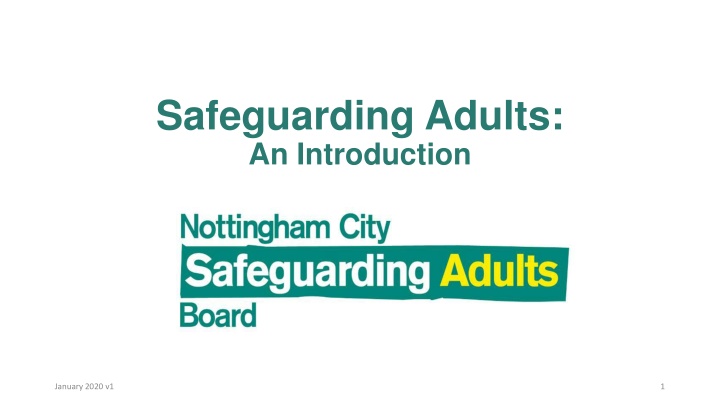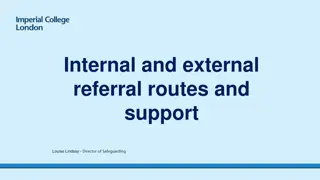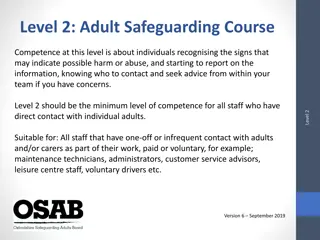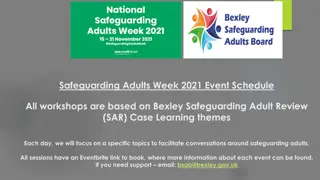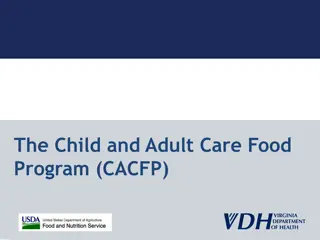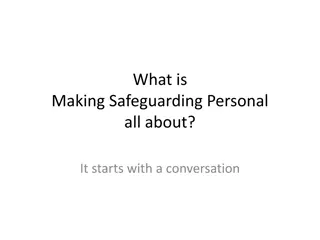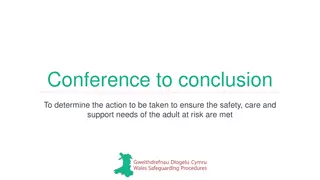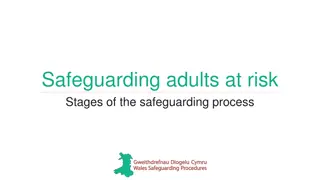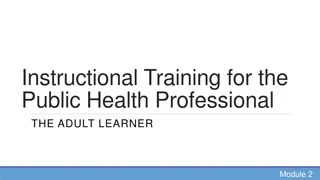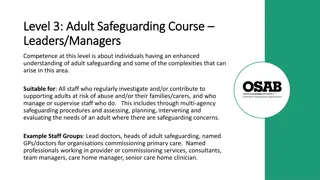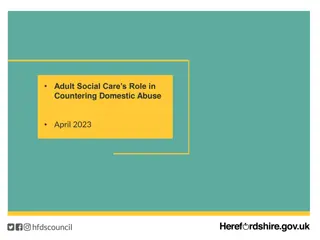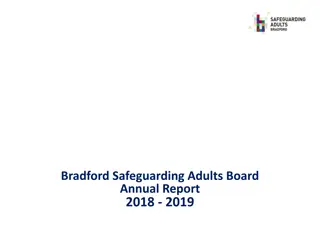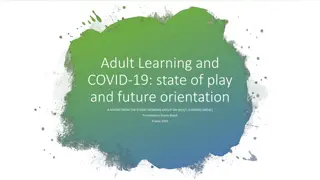Safeguarding Adults: An Introduction to Adult Social Care and Responsibilities
This presentation provides an overview of eligibility criteria for adult social care and its link to adult safeguarding. It covers understanding adult safeguarding and abuse, recognizing types of abuse, and making safeguarding referrals. The Care Act 2014 sets out eligibility criteria for adult social care, and local authorities have duties to investigate and prevent abuse or neglect of adults. Safeguarding responsibilities apply to adults needing care and support who are at risk of abuse or neglect and unable to protect themselves.
Download Presentation

Please find below an Image/Link to download the presentation.
The content on the website is provided AS IS for your information and personal use only. It may not be sold, licensed, or shared on other websites without obtaining consent from the author.If you encounter any issues during the download, it is possible that the publisher has removed the file from their server.
You are allowed to download the files provided on this website for personal or commercial use, subject to the condition that they are used lawfully. All files are the property of their respective owners.
The content on the website is provided AS IS for your information and personal use only. It may not be sold, licensed, or shared on other websites without obtaining consent from the author.
E N D
Presentation Transcript
Safeguarding Adults: An Introduction January 2020 v1 1
Learning Outcomes: At the end of this presentation you should: Have an overview of eligibility criteria for Adult Social Care and how that links to Adult Safeguarding You will be able to: Understand what adult safeguarding and abuse is Recognise types of adult abuse You will know how to: Make an adult safeguarding referral to Nottingham City Council s Adult Social Care (ASC) Department
2014 Care Act eligibility for Adult Social Care: An adult s needs meet the eligibility criteria if The adult s needs arise from or are related to a physical or mental impairment or illness As a result of the adult s needs the adult is unable to achieve two or more of the outcomes specified (see column 2 of next slide) and As a consequence there is, or is likely to be, a significant impact on the adult s well-being
Local Authority Adult Safeguarding Duties: The Care Act 2014 sets out Local Authority Adult Safeguarding Duties: A Local Authority must make enquiries, or ensure others do so, if it believes an adult is subject to, or at risk of, abuse or neglect. An enquiry should establish whether any action needs to be taken to stop or prevent abuse or neglect, and if so, by whom
Safeguarding Responsibilities 1: Safeguarding duties apply to an adult who: Has need for care and support (whether or not the local authority is meeting any of those needs) AND; Is experiencing, or at risk of, abuse or neglect; AND As a result of those care and support needs is unable to protect themselves from either the risk of, or the experience of abuse and neglect
Safeguarding Responsibilities 2: The eligibility criteria for Adult Social Care (as defined by the Care Act 2014) means not all adults experiencing abuse will have a need for care and support (slides 3 and 4). Therefore, they will not meet the criteria for adult safeguarding (slide 6) However, in those circumstances another type of referral may be more appropriate to another agency, e.g. Police, Women s Aid etc. If you are unsure or would like further advice please contact Nottingham City Health & Care Point (NCHP: see slide 21)
Types of abuse defined by the Care Act 2014: Physical Domestic violence Sexual Psychological Financial Modern slavery Discriminatory Organisational (Previously institutional) Neglect / Acts of omission Self neglect
Physical Abuse: Including Assault Hitting Slapping Pushing Misuse of medication Restraint Inappropriate physical sanctions
Domestic Violence: Including Psychological Physical Sexual Financial Emotional abuse So called honour 'based violence
Sexual Abuse: Including Rape Indecent exposure Sexual harassment Inappropriate looking or touching Sexual teasing or innuendo Sexual photography Subjection to pornography or witnessing sexual acts Indecent exposure Sexual assault Sexual acts to which the adult has not consented or was pressured into
Psychological Abuse: Including emotional abuse, threats of harm or abandonment, deprivation of contact, humiliation, blaming, controlling, intimidation, coercion, harassment, verbal abuse, cyber bullying, isolation or unreasonable and unjustified withdrawal of services or supportive networks
Financial or Material Abuse: Including Theft Fraud Internet scamming Coercion in relation to an adult s financial affairs or arrangements, including in connection with wills, property or inheritance or financial transactions The misuse or misappropriation of property, possessions or benefits
Modern Slavery: Encompassing Slavery Human trafficking Forced labour and domestic servitude. Traffickers and slave masters using whatever means they have at their disposal to coerce, deceive and force individuals into a life of abuse, servitude and inhumane treatment
Discriminatory Abuse: Including Harassment Slurs or similar treatment because of: Race Gender and gender identity Age Disability Sexual orientation Religion
Organisational Abuse: Including neglect and poor care practice within an institution or specific care setting such as a hospital or care home, or in relation to care provided in one s own home. This may range from one off incidents to on-going ill-treatment. It can be through neglect or poor professional practice as a result of the structure, policies, processes and practices within an organisation
Neglect and Acts of Omission: Including ignoring medical, emotional or physical care needs Failure to provide access to appropriate health, care and support or educational services The withholding of the necessities of life, such as medication, adequate nutrition and heating
Self-Neglect: This covers a wide range of behaviour including neglecting to care for one s personal hygiene, health or surroundings and includes behaviour such as hoarding
Before making a Safeguarding Referral: If the adult at risk is in imminent danger or you suspect a crime has been committed contact the Police on 999 If the adult at risk has any injury seek appropriate medical attention If the safeguarding incident occurred in another Local Authority (LA) area then refer to that LA If the concern relates to the quality of care provided by a nursing or residential home or home care agency, but does not meet the safeguarding criteria, contact the Care Quality Commission: CQC National Customer Service Centre, Citygate, Gallowgate, Newcastle upon Tyne, NE1 4PA, Tel: 03000 616161, Fax: 03000 616171
Before making a Safeguarding Referral 2: Many organisations have a designated Safeguarding Lead. You may wish to seek advice and discuss concerns with them in the first instance If you think a manager in your organisation might be implicated in the abuse of an adult you should discuss your concerns with a more senior colleague or refer to Nottingham City Council Adult Social Care for advice. Your organisation may have a whistle- blowing policy you can refer to It is a good idea to keep a written record of conversations that can be referenced when you make a safeguarding referral
Consent and Referrals If possible try to get consent from the adult at risk before making an adult safeguarding referral to Adult Social Care You can make a referral without consent, please contact Adult Social Care to discuss
Making a Safeguarding Referral: Safeguarding is everyone's responsibility, if you have concerns please make a referral to Nottingham City Council s Adult Social Care Department to discuss them: Phone Call Nottingham Health and Care Point 0300 131 0300, select option 2 Or email adult.contactteam@nottinghamcity.gov.uk Urgent Out of Hours referrals can be made to the Emergency Duty Team on Tel: 01158761000
Safeguarding Training This slideshow is not a substitute for training. Any training commissioned should explain: What safeguarding is and is not Its statutory basis, with reference to the Care Act & other legislation How to identify abuse What to do when abuse is identified, including alerting others and referring to the LA The need to involve others & make people safe What happens when a referral is made, including enquiries & investigations Confidentiality & working without consent Use of the Mental Capacity Act Whistleblowing & allegations against staff The importance of record keeping & organisational policies Making Safeguarding Personal & Anti-discriminatory practice
